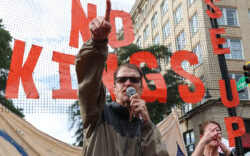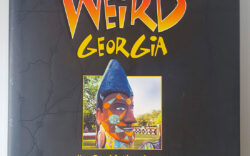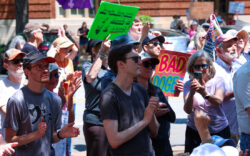“Roll out those lazy-hazy-crazy days of summer,” sang Nat King Cole in 1963. The velvet-voiced crooner’s optimistic anthem to the joys of summer sounds poignant now in the wake of last year’s “summer of our discontent” during the COVID-19 pandemic of 2020.
Last summer, Athens and much of the rest of the U.S. languished in the doldrums of a lockdown that closed schools, churches, bars, restaurants, entertainment venues and other areas where people normally gathered for fun, worship, education, food or fellowship. In a Street Scribe column published on Apr. 1, 2020—not long after the lockdown began—I wrote that Athens had experienced a similar lockdown a century earlier, when the Spanish flu epidemic forced the closing of the University of Georgia and local churches, theaters, restaurants and other businesses. Millions died from that pandemic beginning in 1918. The Georgia State Board of Health said that the state’s death toll had been high and that the worldwide death toll from Spanish flu was “a greater toll of human lives than any past epidemic as far back as we have a history.”
This summer there is cautious optimism that some semblance of normality may yet return to our world. Such a hope could prove chimerical until and unless more people are vaccinated against COVID-19. The injections are quick and painless, but incessant TV close-ups of needles piercing arms only serve to instill even more fear into those who already are leery of injections. Other Americans fear not the needle, but the vaccine itself. Such “anti-vaxxers” are slowing the herd immunity needed to curb the virus, but their resistance is nothing new. On May 22, 2019—months before the COVID pandemic began—I wrote that measles was making a comeback and that “anti-vaxxers” were resisting injections in spite of the fact that most of the new infections of measles were among the unvaccinated. “Today it is fashionable in some circles to sneer at science, including medical science,” I wrote in 2019. Sadly, that sentiment still holds true today.
Summer has always been my favorite season, and I long for the summertime of the not-too-distant past, the summertime that George Gershwin captured in song, the summertime when “the living is easy.” COVID-19 has left us an uneasy nation much in need of the healing hand of a carefree summer.
All the seasons have their charms. Spring brings forth new life into the weary world. Fall features Mother Nature’s autumnal artistry. Even winter’s gloom and chill can be transformed by the magic of a surprise snowstorm. Still, summer is my favorite time, a time of memories that never fade.
Among my favorite summertime memories are the simple seasonal joys of lightning bugs blinking in the evening twilight and the electric aroma in the air after a thunderstorm has passed. I’ve always enjoyed the July 4th holiday every summer, and attending America’s bicentennial ceremonies in Washington on July 4, 1976 was a memorable way to celebrate the holiday. An activist group called the People’s Bicentennial Commission rallied on the National Mall with warnings about corporate power that presaged the same concerns voiced by the Occupy Wall Street movement decades later. That night the National Symphony played a thunderous concert on the Capitol Lawn as overhead a dazzling fireworks display wowed the crowd with sound and light.
In 1976, Americans gathered in Washington for a summer celebration of pride, patriotism and peaceful dissent on America’s 200th birthday. In 2021, just 45 years later, angry Americans besmirched the Capitol during a right-wing melee that was anything but peaceful and patriotic. The wounds from that insurrection remain unhealed, and the pandemic lingers, but summer is here, and the living is better, if not yet easy. Let’s hope that this summer will be like those that author Ada Louise Huxtable described when she wrote, “Summer is the time when one sheds one’s tensions with one’s clothes, and the right kind of day is jeweled balm for the battered spirit. A few of those days and you can become drunk with the belief that all’s right with the world.”
Like what you just read? Support Flagpole by making a donation today. Every dollar you give helps fund our ongoing mission to provide Athens with quality, independent journalism.










